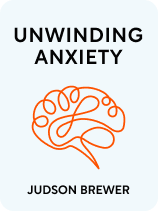

This article is an excerpt from the Shortform book guide to "Unwinding Anxiety" by Judson Brewer. Shortform has the world's best summaries and analyses of books you should be reading.
Like this article? Sign up for a free trial here.
How hard is it to get over anxiety? What will get in your way if you seek treatment?
Even if you fully buy into the goal of eliminating your anxiety, you might run into additional roadblocks. Dr. Judson Brewer’s book Unwinding Anxiety says that the two main roadblocks are overthinking and beating yourself up.
Keep reading to learn why getting over anxiety isn’t as easy as many people think.
1. Overthinking
Brewer warns that it’s easy to overthink things when you’re getting over anxiety. Overthinking can take several forms:
- Getting stuck in the conceptual stage—that is, mapping out habit loops without actually doing anything about them.
- Applying old knowledge and habits to try to change anxiety. As we’ve seen, a lot of habit change strategies don’t work on anxiety. Plus, as Brewer points out, there’s no sense in trying to change anxiety using the same behaviors and thought processes that created it in the first place.
- Viewing mindfulness as knowledge instead of a skill. You have to practice regularly to get any benefit.
- Trying to figure out why you’re anxious—which doesn’t actually matter. He says you don’t need to diagnose a root cause to fix the problem, and obsessing about why you’re this way or why you haven’t gotten better only makes the situation worse.
(Shortform note: While Brewer warns against “overthinking” anxiety, there may be some benefit to combining mindfulness with a more analytical approach. In Emotional Intelligence, Daniel Goleman argues that to defeat anxiety, you need to actively challenge your anxious thoughts—he suggests asking yourself how likely a feared outcome is, determining what you could do to prevent that outcome or deal with it if it occurred, and questioning whether your worrying is actually helping you. Similarly, in Cognitive Behavior Therapy: Basics and Beyond, Judith S. Beck argues that treating mood disorders like anxiety requires identifying and correcting automatic thoughts and finding and reprogramming the core beliefs that lead to these thoughts.)
2. Beating Yourself Up
Any kind of change comes with the danger that you’ll beat yourself up if things don’t go smoothly or you slip up. But as we’ve seen, harsh self-judgment is part of the anxiety loop, meaning that if you let it run free, you’ll only create more anxiety for yourself.
Plus, Brewer says that a negative attitude (frustration, pessimism, and so on) makes behavior change harder. If you tell yourself that changing your habits is impossible, you’re less likely to succeed. If you tell yourself that change is painful, you’re more likely to avoid doing the work (and more likely to revert to anxiety-related habits).
(Shortform note: Similarly, if you shame yourself for your anxious behaviors or for being anxious in the first place, you might not even try to change because you won’t believe it’s possible to do so. Likewise, as Brené Brown argues in The Gifts of Imperfection, shame can make you feel like you don’t deserve to do any better than you’re doing.)
To rewrite self-critical attitudes, Brewer recommends learning to see apparent failures—such as reverting to old, unwanted behavior—as learning opportunities. In other words, even when you make a mistake, as long as you respond with curiosity (rather than frustration, self-recrimination, or similar), you can still keep moving forward. Brewer says if you approach habit change with this learning mindset, you’re less likely to beat yourself up and more likely to stay positive even when things don’t go perfectly.
How to Avoid Perfectionism
When attempting to get over anxiety—or make any kind of behavioral change—it’s important to avoid perfectionism. As Brené Brown points out, if you expect yourself to be perfect, you’ll only undermine your efforts to change, because as soon as you make a mistake, you’ll conclude that it’s because you weren’t good enough—which only restarts the cycle of anxiety.
When it comes to avoiding perfectionism, it might help to remember that failures often lead to creative insights and new ideas for solving problems. In fact, in Designing Your Life, Bill Burnett and Dave Evans recommend becoming immune to failure. Doing so doesn’t mean not failing—it means changing your attitude toward failure.
Burnett and Evans explain that if you build your life around curiosity and experimentation (as Brewer recommends), you’ll experience more failures than if you played it safe and stayed on autopilot. Moreover, they point out that these failures are beneficial because they give you information and ideas that can fuel future successes.

———End of Preview———
Like what you just read? Read the rest of the world's best book summary and analysis of Judson Brewer's "Unwinding Anxiety" at Shortform.
Here's what you'll find in our full Unwinding Anxiety summary:
- How to recognize and counteract anxiety with mindfulness
- Why anxiety becomes is toxic if left untreated
- A three-step method for treating anxiety






